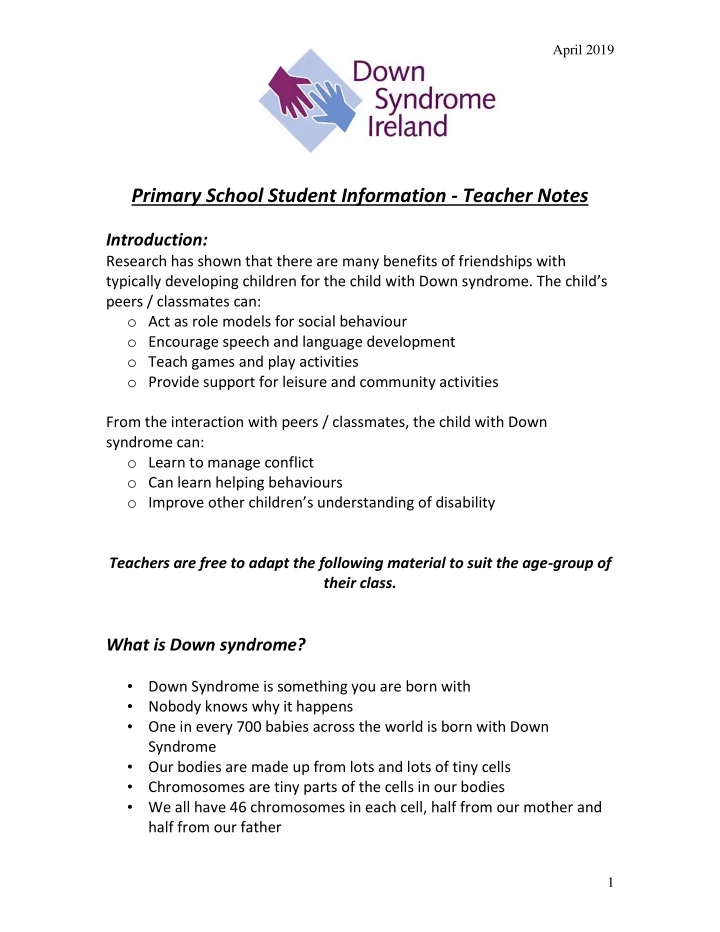

April 2019 Primary School Student Information - Teacher Notes Introduction: Research has shown that there are many benefits of friendships with typically developing children for the child with Down s yndrome. The child’s peers / classmates can: o Act as role models for social behaviour o Encourage speech and language development o Teach games and play activities o Provide support for leisure and community activities From the interaction with peers / classmates, the child with Down syndrome can: o Learn to manage conflict o Can learn helping behaviours o Improve other children’s understanding of disability Teachers are free to adapt the following material to suit the age-group of their class. What is Down syndrome? • Down Syndrome is something you are born with • Nobody knows why it happens • One in every 700 babies across the world is born with Down Syndrome • Our bodies are made up from lots and lots of tiny cells • Chromosomes are tiny parts of the cells in our bodies • We all have 46 chromosomes in each cell, half from our mother and half from our father 1
April 2019 • A baby born with Down syndrome has one extra chromosome - 47 instead of 46 • All children with Down syndrome look a bit alike but they also look like their families • All children with Down syndrome have some difficulty learning • They may need extra help, which they get from their families, their teachers and their friends • They may be slow to learn to talk, walk & play • They may need extra help to dress & wash • They may need extra help with school work and solving problems Remember! We all need extra help to do things sometimes. • Sometimes, children with Down syndrome might have lots of coughs, colds or other illnesses • They might have to see a doctor a little more often than other people • Sometimes, they might have difficulty with their eyes and ears - they might need to wear glasses or have help to hear properly • Sometimes, they have difficulty speaking clearly What Do We Need To Do? • Accept the child with Down syndrome for who they are • Try to do fun things together • Talk to the child with Down syndrome about the things that you do. It might be hard to understand what the child is saying sometimes, but be patient when they are trying to tell you something Sometimes, you may worry about the child with Down syndrome. Maybe someone might say things about the child with Down syndrome that might upset you. If this happens: • Tell your teacher or another adult at your school • All children might not understand what it means to have Down syndrome - this may lead them to tease and make fun of the child with Down syndrome • Try to tell them about Down syndrome. Ask your teacher to help you to explain it to them 2
April 2019 Try to find out what the child with Down syndrome likes or dislikes • Look at the problems the child with Down syndrome has overcome • Praise him/her to others • Let others know what he/she can do • We can be playmates to share fun activities • We can help each other to share and co-operate • We can help each other to cope with disappointment or hostility • We can share our worries and our pleasures More Information • As you get older, you might want to find out more about Down Syndrome • There are many ways to find this information - ask your teacher to help you • You will find more information on the Down Syndrome Ireland website https://downsyndrome.ie/wp- content/uploads/2018/03/DSI_StudentPack_Home.pdf https://downsyndrome.ie/wp-content/uploads/2018/03/Guidelines-for- Post-Primary-Schools-Supporting-Students-with-Special-Educational- Needs-in-Mainstream-Schools-1.pdf https://downsyndrome.ie/support-detail/education-professionals/ Remember! A child with Down Syndrome is a person first and is just like you, they have the same hopes, needs and feelings They are more like you, than they are different. 3
Recommend
More recommend